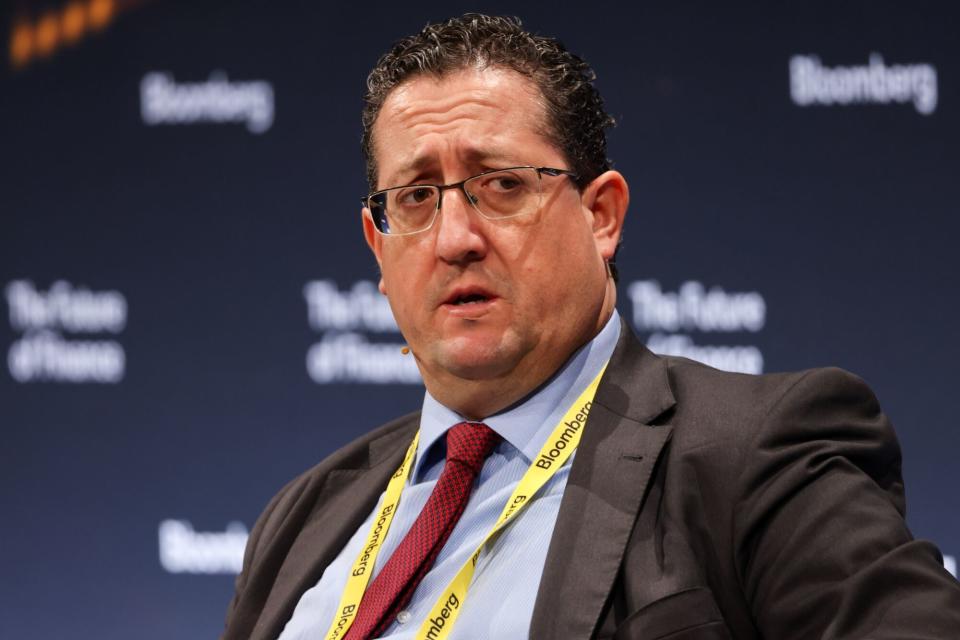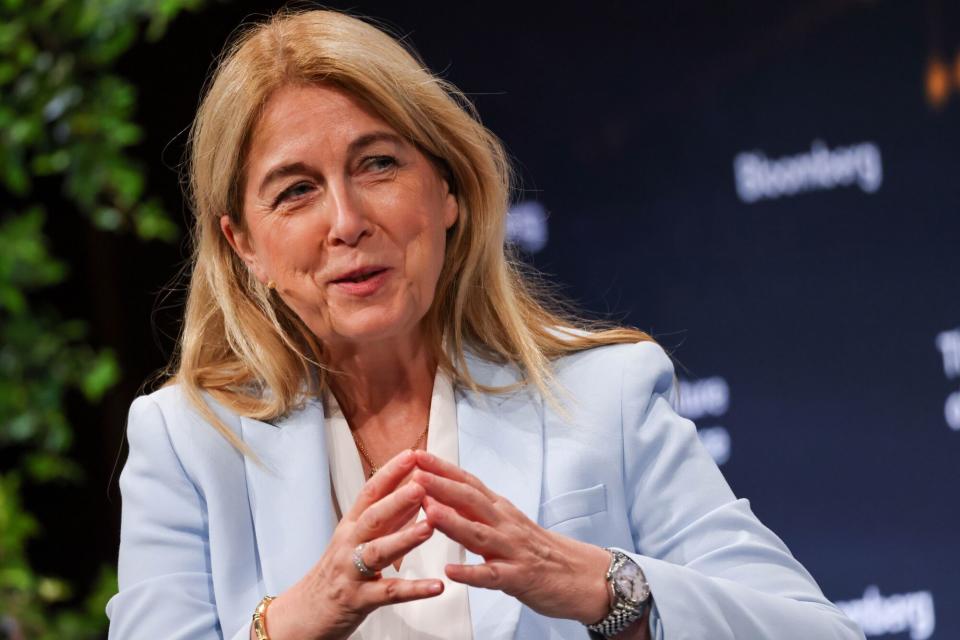Barclays to Goldman See Dealmaking Rebound: Future of Finance
(Bloomberg) -- Barclays Plc expects dealmaking to rebound in the first half of next year, the head of the lender’s German operations said, joining her counterpart at Goldman Sachs Group Inc. in painting a positive picture for the industry.
Most Read from Bloomberg
Vegas’ Newest Resort Is a $3.7 Billion Palace, 23 Years in the Making
Fed Set to Pause Rate Hikes, But Don’t Count Out Another Increase
Dollar Rally Is Crushing One of the Most Popular Trades of 2023
Ingrid Hengster, chief executive officer for Germany at Barclays, told Bloomberg’s Future of Finance conference in Frankfurt that she was “quite bullish” about mergers and acquisitions. Interest rates are peaking and there’s now more confidence in the leveraged finance markets, she said at the event on Tuesday.
Her comments echo remarks of Goldman Sachs Group Inc.’s head for Germany and Austria, Wolfgang Fink, who said he’s seeing investor interest in initial public offerings and deals rising again. That’s even as officials from the European Central Bank and the International Monetary Fund cautioned that the region’s manufacturers were in a very weak state, with services were bound to follow.
Top policy makers and executives are gathered at the annual event to discuss the state of Europe’s largest economy and the challenges for corporations and government. The rapid shift away from Russian fossil fuels, fragmentations in global trade and an aging society have sparked a debate about whether Germany is again facing a period of underperformance.
Key Developments
Financing Recovery to Spur 2024 Deal Bounce: Barclays’ Hengster
DWS CEO Hoops Says Inflows ‘Solid’ as 2023 Recovery Continues
ECB Can’t Afford Interest-Rate Cuts Next Year, IMF’s Kammer Says
Germany Joins Argentina as Only G-20 Member Facing GDP Drop
(All times CET)
Lilium Says Germany No Great Place to Get Funding (4:45 p.m.)
Lilium NV CEO Klaus Roewe says Germany is one of the worst places to get financing for start-ups. Lilium is among companies leading the drive to develop electric vertical take-off and landing craft, as flying taxis are known. Roewe says of the company’s total funding, very little comes from Germany. German investors only want to finance a product once all risk is eliminated, making life difficult for start-ups, he said.
KKR Sees No Quick Return for $10 Billion Deals (4:20 p.m.)
Christian Ollig, partner and head of the German-speaking region at KKR & Co., cautioned there will be no quick return to $10 billion-plus transactions while financing markets continue their recovery — even with private credit providers ready to step in. “At the end of the day it’s also a risk, return question,” he said. “You need to take into account higher financing costs, so this has an impact on valuations.”
DWS Says German Economy Doing Better Than Feared (3:45 p.m.)
Germany’s economy isn’t doing as badly as sentiment may suggest, the head of Deutsche Bank AG’s asset manager DWS Group said. The economy is “okay, not great,” Stefan Hoops said. Gross domestic product is “going sideways” when adjusted for inflation, employment is very low and the stock market is “actually quite positive.”
Savings Banks Say Rate Increases Were ‘Stress Test’ (2:30 p.m.)
The pace of the monetary tightening of the ECB was a stress test for Germany’s savings banks, said the head of the savings banks association, Helmut Schleweis. The lenders had to write down around €8 billion last year because rising rates weighed on the valuation of bonds in their portfolios.
“The pace was quite unexpected to everyone in the sector and it was a bit of a stress test,” Schleweis said. He reiterated that consolidation among Germany’s regional Landesbanken would happen at some point, even as it remained elusive during his presidency. “We will see it, I’m quite sure.”
Goldman Sees Investor Interest in Deals, IPOs (2 p.m.)
Goldman’s Fink is seeing investor interest in initial public offerings and deals rising again as central banks appear to near the end of a series of rate increases.
“We still have to wait for larger transactions but there’s more activity and there are more investors willing to put down capital, indicating there’s more activity to come,” Fink said at Bloomberg’s Future of Finance conference in Frankfurt.
Fink said while he was optimistic about companies’ ability to address challenges, growth remains sluggish in Europe and China and not coming back at the speed that people would hope for and expect.
ECB’s Arce Sees No 1970s Style Inflation (1:30 p.m.)
Oscar Arce, the European Central Bank’s director general for economics and research, hit a similar note, saying that services are now losing momentum and manufacturers already are “very, very weak.”
“It all depends on the definition of stagflation but we are not in front of something similar to what we saw in the 1970s,” said ECB’s Arce about the prospect of stagflation. “We are seeing strong growth of wages by historical standards but still we are not in a situation comparable to what we saw in the 70s.”
IMF Says Inflation Is No.1 Problem (1:27 p.m.)
“Inflation is the No. 1 problem that needs to be brought under control,” said Alfred Kammer, the International Monetary Fund’s European director. Inflation in the euro area has almost halved from a record 10.6% in October, but still is above 5%, more than twice the ECB’s target.
“Sluggish growth” in the region is in line with what his institution had been expecting, he said. Manufacturing output is slowing and services are set to follow, he said.
Most Read from Bloomberg Businessweek
Starbucks Has 383 Billion Different Lattes and That’s a Problem
Why Dollar General Might Just Be the Worst Retail Job in America
©2023 Bloomberg L.P.



